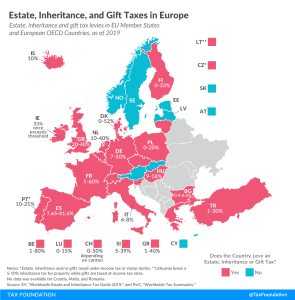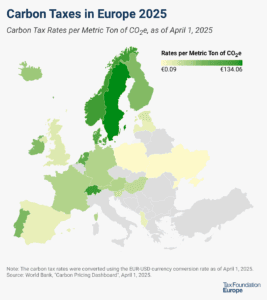
Providing journalists, taxpayers, and policymakers with basic data on taxes and spending is a cornerstone of Tax Foundation Europe’s educational mission.
As a nonpartisan, educational organization, the Tax Foundation has earned a reputation for independence and credibility.
Our policy team regularly provides accessible, data-driven insights from sources such as the European Commission, the Organisation for Economic Co-Operation and Development (OECD), and others.
Featured Data
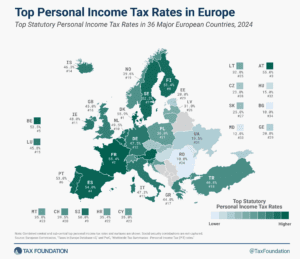
Top Personal Income Tax Rates in Europe, 2024
Denmark (55.9 percent), France (55.4 percent), and Austria (55 percent) have the highest top statutory personal income tax rates among European OECD countries.
3 min read
VAT Rates in Europe, 2024
A few European countries have made changes to their VAT rates, including the Czech Republic, Estonia, Switzerland, and Turkey.
3 min read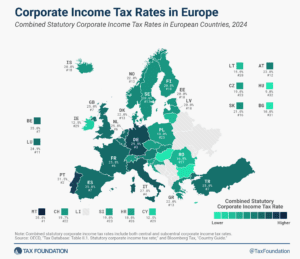
Corporate Income Tax Rates in Europe, 2024
Like most regions around the world, European countries have experienced a decline in corporate income tax rates over the past four decades, but the average corporate income tax rate has leveled off in recent years.
2 min read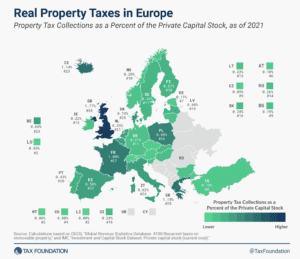
Real Property Taxes in Europe, 2023
High property taxes levied not only on land but also on buildings and structures can discourage investment in infrastructure, which businesses would have to pay additional tax on.
2 min read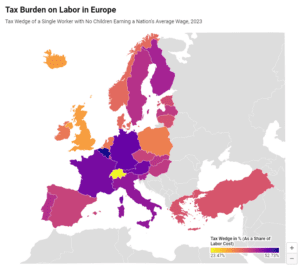
Tax Burden on Labor in Europe, 2024
To make the taxation of labor more efficient, policymakers should understand the inputs into the tax wedge, and taxpayers should understand how their tax burden funds government services.
4 min read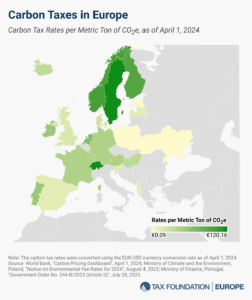
Carbon Taxes in Europe, 2024
23 European countries have implemented carbon taxes, ranging from less than €1 per metric ton of carbon emissions in Ukraine to more than €100 in Sweden, Liechtenstein, and Switzerland.
3 min readAll European Tax Data
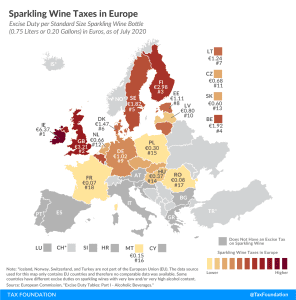
Sparkling Wine Taxes in Europe
This week, people around the world will celebrate New Year’s Eve, with many opening a bottle of sparkling wine to wish farewell to—a rather consequential—2020 and offer a warm welcome to the—by many of us, long-awaited—new year 2021.
1 min read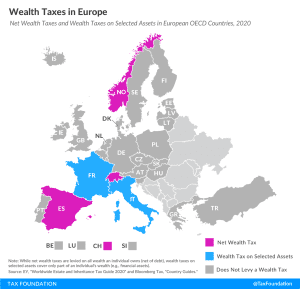
Wealth Taxes in Europe, 2020
Net wealth taxes are recurrent taxes on an individual’s wealth, net of debt. The concept of a net wealth tax is similar to a real property tax. But instead of only taxing real estate, it covers all wealth an individual owns. As today’s map shows, only three European countries covered levy a net wealth tax, namely Norway, Spain, and Switzerland. France and Italy levy wealth taxes on selected assets but not on an individual’s net wealth per se.
3 min read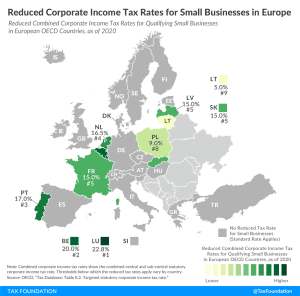
Reduced Corporate Income Tax Rates for Small Businesses in Europe
Corporate income taxes are commonly levied as a flat rate on business profits. However, some countries provide reduced corporate income tax rates for small businesses
2 min read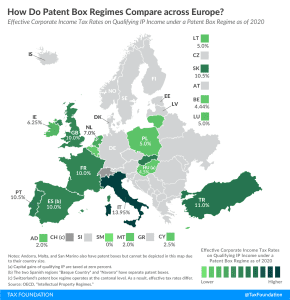
Patent Box Regimes in Europe, 2020
Patent box regimes (also referred to as intellectual property, or IP, regimes) provide lower effective tax rates on income derived from IP.
4 min read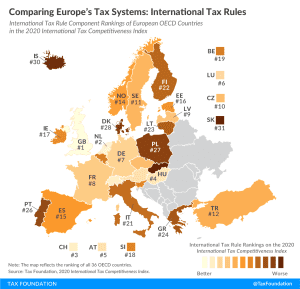
Comparing Europe’s Tax Systems: International Tax Rules
International tax rules define how income earned abroad and by foreign entities are taxed domestically, making them an important element of a country’s tax code.
3 min read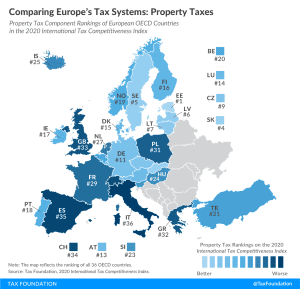
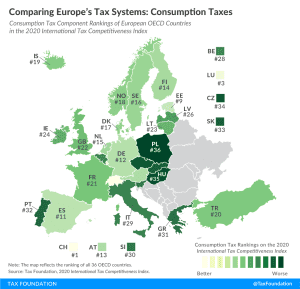
Comparing Europe’s Tax Systems: Consumption Taxes
How do consumption tax codes compare among European OECD countries? Explore our new map to see how consumption tax systems in Europe compare.
2 min read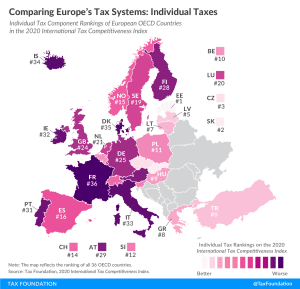
Comparing Europe’s Tax Systems: Individual Taxes
How do individual income tax codes compare among European OECD countries? Explore our new map to see how individual income tax systems in Europe compare.
3 min read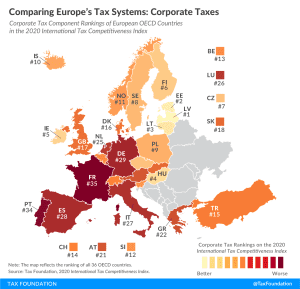
Comparing Europe’s Tax Systems: Corporate Taxes
A tax code that is competitive and neutral promotes sustainable economic growth and investment while raising sufficient revenue for government priorities.
3 min read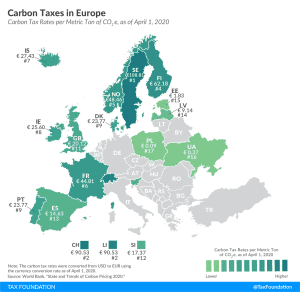
Carbon Taxes in Europe, 2020
17 European countries have implemented a carbon tax, ranging from less than €1 per metric ton of carbon emissions in Ukraine and Poland to over €100 in Sweden.
3 min read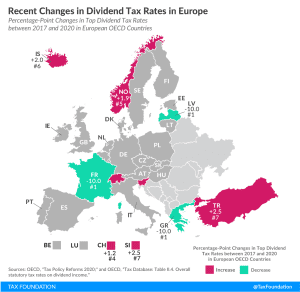
Recent Changes in Dividend Tax Rates in Europe
Over the last three years, eight European OECD countries have made changes to their dividend tax rates. Iceland, Norway, Slovenia, Switzerland, and Turkey increased their rates, each between roughly one and three percentage points. France, Greece, and Latvia cut their rates by 10 percentage points.
2 min read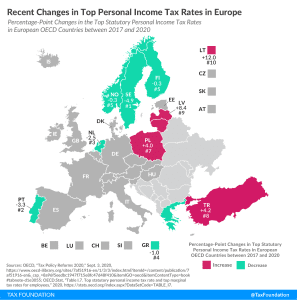
Recent Changes in Top Personal Income Tax Rates in Europe
Ten European OECD countries recently changed their top personal income tax rates. Of the ten countries, six cut their top personal income tax rates while the other four raised their top rates.
4 min read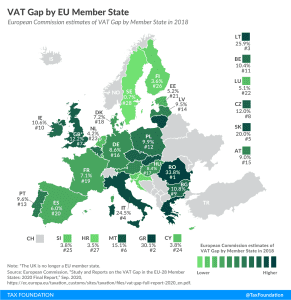
New European Commission Report: VAT Gap
Just as COVID-19 is putting pressure on other sources of revenue, the loss of VAT revenues resulting from the crisis will force governments to evaluate their VAT systems.
3 min read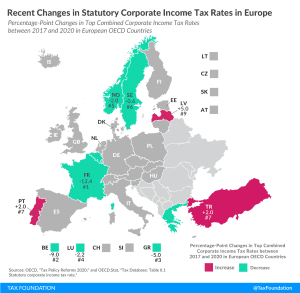
Recent Changes in Statutory Corporate Income Tax Rates in Europe
Over the last two decades, corporate income tax rates have declined around the world. Our new map shows the most recent changes in corporate tax rates in European OECD countries, comparing how combined statutory corporate income tax rates have changed between 2017 and 2020.
3 min read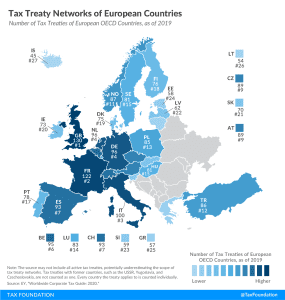
Tax Treaty Network of European Countries
Tax treaties usually provide mechanisms to eliminate double taxation and can provide certainty and stability for taxpayers and encourage foreign investment and trade. A broad network of tax treaties contributes to the competitiveness of an economy.
1 min read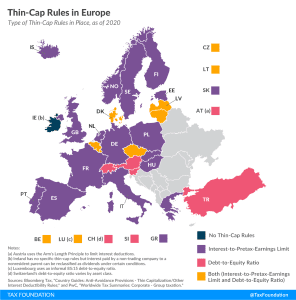
Thin-Cap Rules in Europe
To discourage a certain form of international debt shifting, many countries have implemented so-called thin-capitalization rules (thin-cap rules), which limit the amount of interest a multinational business can deduct for tax purposes.
4 min read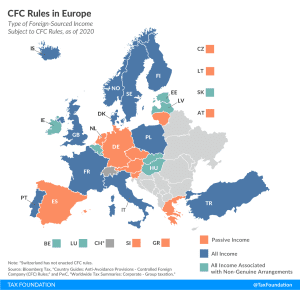
CFC Rules in Europe
To prevent businesses from minimizing their tax liability by taking advantage of cross-country differences in taxation, countries have implemented various anti-tax avoidance measures, one known as Controlled Foreign Corporation (CFC) rules.
5 min read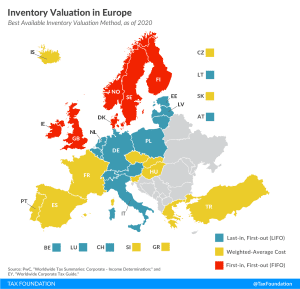
Inventory Valuation in Europe
The method by which a country allows businesses to account for inventories can significantly impact a business’s taxable income. When prices are rising, as is usually the case due to factors like inflation, LIFO is the preferred method because it allows inventory costs to be closer to true costs at the time of sale.
2 min read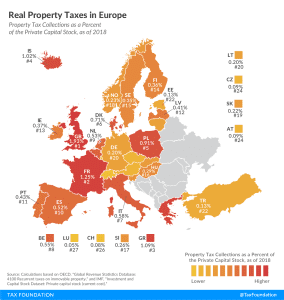
Real Property Taxes in Europe, 2020
High property taxes levied not only on land but also on buildings and structures can discourage investment because they disincentivise investing in infrastructure, which businesses would have to pay additional tax on. For this reason, it may also influence business location decisions away from places with high property tax.
3 min read